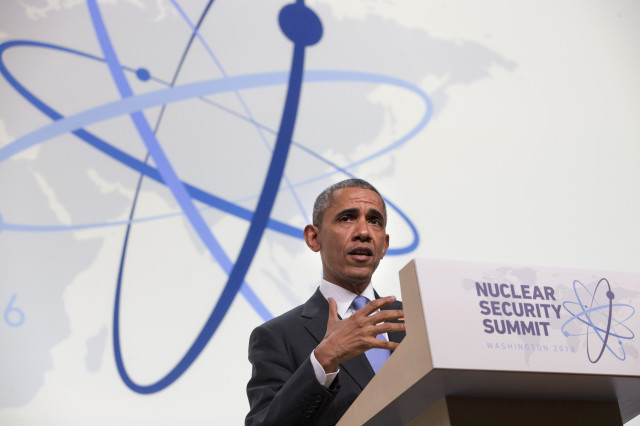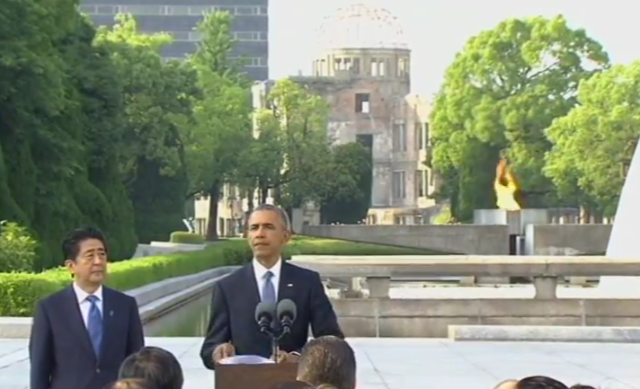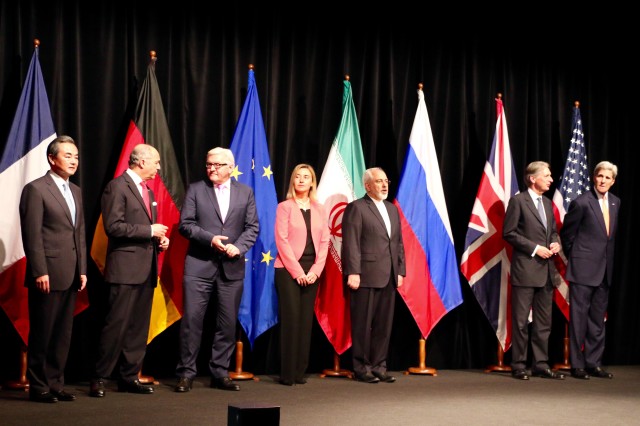
President Barack Obama speaks during a news conference at the conclusion of the Nuclear Security Summit in Washington April 1, 2016. (AP)
As time ticks away on the presidential term of Barack Obama, there’s a sense of urgency for him to fulfill promises made over the past eight years. Especially on nuclear weapons.
Obama has made progress toward his “commitment to seek the peace and security of a world without nuclear weapons” made during his first foreign policy speech in April 2009. With his final speech before the United Nations General Assembly set for next Tuesday, there’s speculation that Obama may push further.
One policy idea being debated: “no first use” of nuclear weapons.
The United States was the first and so far only nation to use a nuclear weapon against another nation. Would such a policy make the United States more secure? Less secure? What do the allies think? Is a “no first use” policy believable?
Refusing to Nuke First
Dominic Tierney – The Atlantic
Since its first nuclear test in 1964, China has repeatedly declared that it “undertakes not to be the first to use nuclear weapons at any time or under any circumstances.” It’s no coincidence that China is the most powerful East Asian country, and would hold the advantage in any conventional war with South Korea, Vietnam, Japan, or Taiwan (assuming, of course, that the United States stayed out). The spread of nuclear weapons in East Asia would diminish China’s strategic advantage; therefore, Beijing seeks to prevent this outcome with a no-first-use policy….
By contrast, weak states don’t even think about a no-first-use policy. Indeed, threatening to push the button early in a conflict is the basis of their deterrent plan. During the Cold War, when the Soviet Union had conventional superiority in Europe, the United States and its NATO allies intended to escalate to nuclear war if the Red Army launched an invasion. Similarly, today, Pakistan explicitly threatens to retaliate with nuclear weapons if it is ever attacked—even through a conventional invasion.
Barack Obama speech in Prague, Czech Republic April 7, 2009 in which he committed to reduce nuclear weapons in the world.
The Dangers of No First Use
Franklin C. Miller & Keith B. Payne – Bulletin of the Atomic Scientists
A US pledge of no-first-use now would encourage current and future opponents to believe that they need not fear the US nuclear deterrent in response to their potential massive use of military force against us or our allies—including the use of advanced conventional weapons, and chemical and biological weapons….
Consequently, declaring a no-first-use policy would degrade the prospective credibility of the US nuclear deterrent—a particularly imprudent step at a time when Russia and China are rapidly expanding their military capabilities, pursuing aggressive policies in Europe and Asia respectively, and issuing explicit threats to US allies in the process.
US adoption of no-first-use would also severely shake allied confidence in our security guarantees to them. In fact, US allies Japan, South Korea, Great Britain, and France reportedly have recently informed the Obama administration that a no-first-use policy would be detrimental to their security. The vast majority of our treaty allies depend, at least in part, on a credible US nuclear deterrence “umbrella” for their security.
Rethink Oldthink on No First Use
Kingston Reif & Darryl G. Kimball – Bulletin of the Atomic Scientists
U.S. President Barack Obama and Japanese Prime Minister Shinzo Abe deliver comments at the Hiroshima Peace Park May 27, 2016. Obama is the first U.S. president to visit Hiroshima or Nagasaki since an atomic bomb was dropped on those cities in August 1945. (TV pool screen grab)
The circumstances that led US leaders to reserve the option to use nuclear weapons first in a conflict are long gone. Today, the United States and its allies have the means to counter any realistic nonnuclear military threat with superior conventional military, economic, and alliance capabilities. The threat of first use also lacks credibility, since the costs of such use would greatly outweigh the benefits.
Among other advantages, a clear US no-first-use policy would reduce the risk of Russian or Chinese nuclear miscalculation during a crisis by alleviating concerns about a devastating US nuclear first-strike….
Today, given its overwhelming conventional military, economic, and alliance advantages, the United States does not need to threaten to use nuclear weapons to deter or defeat a major conventional attack against the homeland or US allies.
No First Use Nuclear Pledge Bad for U.S. Standing in Asia
Hugh White – The Straits Times
A declaration that the United States would no longer threaten to use its nuclear weapons to defend (U.S. Allies) against a conventional attack would erode their confidence because it would implicitly acknowledge that the threat was not credible.
Combined with the knowledge that the United States could no longer easily win a conventional war against an adversary like China, this would be a big blow to the US’ standing as the leading strategic power in Asia and the guarantor of its allies’ security.
The reality is that while it might make perfect sense in the light of new strategic realities, and perhaps even help to move the world towards nuclear disarmament, an NFU declaration would weaken the United States’ standing in Asia by amplifying the message that it no longer has the will to stand up to China.
End the First-Use Policy for Nuclear Weapons
James E. Cartwright & Bruce G. Blair – The New York Times
Delegation leaders from P5+1 nations, the EU and Iran assemble to announce deal to limit Iran’s nuclear weapons program in Vienna July 14. From left, China’s Foreign Minister Wang Yi, France’s Foreign Minister Laurent Fabius, Germany’s Foreign Minsiter Frank-Walter Steinmeier, EU High Representative for Foreign Affairs Federica Mogherini, Iran’s Foreign Minister Javad Zarif, UK Foreign Minister Philip Hammond, U.S. Secretary of State John Kerry. (VOA/Brian Allen)
Our nonnuclear strength, including economic and diplomatic power, our alliances, our conventional and cyber weaponry and our technological advantages, constitute a global military juggernaut unmatched in history. The United States simply does not need nuclear weapons to defend its own and its allies’ vital interests, as long as our adversaries refrain from their use.
Using nuclear weapons first against Russia and China would endanger our and our allies’ very survival by encouraging full-scale retaliation. Any first use against lesser threats, such as countries or terrorist groups with chemical and biological weapons, would be gratuitous; there are alternative means of countering those threats….
[R]uling out first use would also bring myriad benefits. To start, it would reduce the risk of a first strike against us during global crises. Leaders of other countries would be calmed by the knowledge that the United States viewed its own weapons as deterrents to nuclear warfare, not as tools of aggression.
Just Saying ‘No’ to ‘No First Use’ is Good Policy
Eric Rozenman – Jewish Policy Center
A world in which the United States has issued a no-first-use vow also would be one in which countries with fewer constraints—North Korea and Iran come to mind—might assume that first use will get them what they want and the United States would decline to retaliate in kind because, well, what’s done is done. Far from discouraging aggressive or rogue countries, it would encourage them to test American resolve.
If Washington’s 2015 deal with Tehran guarantees Iranian nuclear weapons down the road, then a “no-first-use” vow on our part might be irrelevant at best, further destabilizing at worst. Sometimes creative ambiguity may actually just be creative.



